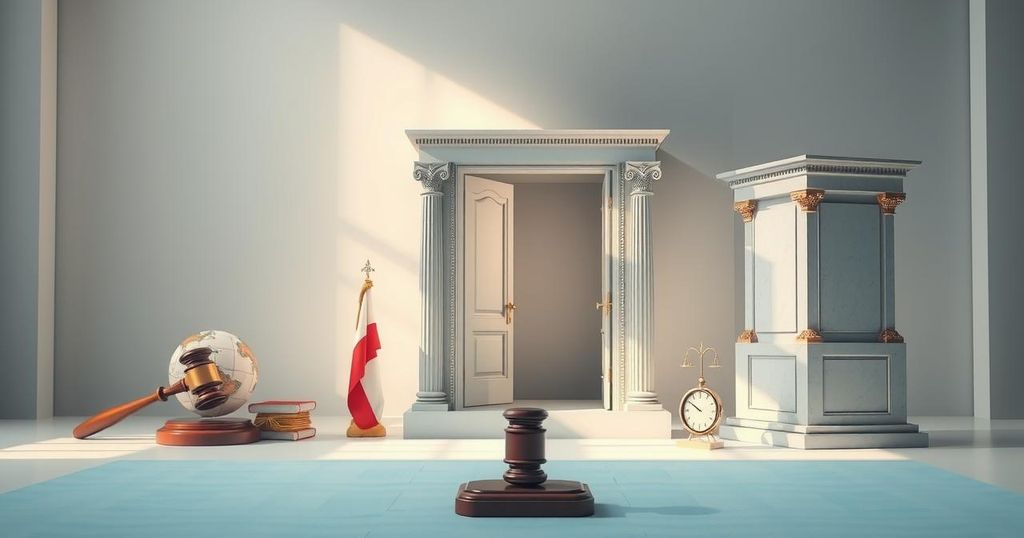World news
ASIA, ATLANTIC COUNCIL, DW, EUROPE, EUROPE/ASIA, EUROPEAN UNION, HERBST, INTERNATIONAL RELATIONS, JAPAN, JOHN HERBST, KEITH KELLOGG, KELLOGG, KYIV, MOSCOW, NORTH AMERICA, PEACE NEGOTIATIONS, PIERS MORGAN, PUTIN, REUTERS, RUSSIA, RUSSIA-UKRAINE WAR, THE, THE ATLANTIC COUNCIL, TRUMP, UKRAINE, UNITED STATES, US, US PRESIDENTIAL RACE, USA, VLADIMIR PUTIN, VOL, VOLODYMYR ZELENSKYY, WAR, WASHINGTON, ZELENSKYY
Lena Nguyen
0 Comments
Uncertainty Looms Over Ukraine’s Presidential Elections Amid Ongoing Conflict
The article discusses the uncertainty surrounding Ukraine’s presidential elections, delayed due to the ongoing war with Russia. President Zelenskyy insists elections can occur only after martial law is lifted. U.S. officials advocate for elections, while Russian authorities demand their implementation as a prerequisite to negotiate peace. Experts warn against premature elections that could destabilize Ukraine further.
In Ukraine, the question of when presidential elections will take place remains uncertain due to the ongoing war with Russia. President Volodymyr Zelenskyy maintains that elections can only occur after martial law is lifted and the active conflict subsides. In a recent interview, he reiterated, “The hot phase of the war will end, and when martial law is lifted, elections will be announced.”
The topic has gained increased attention following comments by the new U.S. special envoy for Ukraine and Russia, Keith Kellogg, who expressed the desire for elections to occur possibly by the end of this year, should a truce with Moscow be established. Kellogg argued that elections would foster democracy, a viewpoint echoed by several U.S. politicians who pressed Ukraine to conduct elections despite the war. Meanwhile, Russian President Vladimir Putin has questioned the legitimacy of Zelenskyy in light of the delayed elections.
Ukraine’s Constitution prohibits elections under martial law, prompting Moscow to insist that a new election must be held before it agrees to settle the conflict. Some analysts suggest that U.S.-backed elections could be part of a broader strategy to conclude the war, while others caution against such a move, believing that elections could destabilize Ukraine further.
Former U.S. Ambassador John Herbst indicated Russia’s stance aims to prolong negotiations, asserting that utilizing elections to facilitate talks would be a misstep. Moreover, expert Winfried Schneider-Deters warned that Russia seeks to exploit electoral unrest and division in Ukraine, urging the government not to yield to external pressure for elections.
Thomas Greminger, former OSCE secretary general, cautioned that conditions necessary for free and fair elections are currently absent, as many areas remain under Russian control. He emphasized that stability and preparation are prerequisite for elections, adding that premature voting could exacerbate tensions and undermine democracy.
Herbst and Greminger both noted that the potential for elections in the near term is exceedingly low, citing the ongoing military conflict and the lack of necessary conditions like voter freedom and security. The consensus among experts is that the odds of holding presidential elections in Ukraine this year are slim, potentially undermining the current leadership’s stability.
Overall, the situation remains fluid, as President Zelenskyy has indicated a willingness to compromise for future elections, yet emphasizes that specific conditions must be met to ensure the electoral process’s integrity.
This article delves into the critical issue of presidential elections in Ukraine amid the ongoing Russian invasion. The political climate is heavily influenced by the war, which has led to martial law prohibiting elections. International stakeholders, particularly from the U.S., are advocating for elections as a means to promote democracy, while concerns about the legitimacy and conditions surrounding these elections are raised by various experts and politicians. The article outlines complexities surrounding such decisions amid ongoing conflict and highlights divergent views on the timing and feasibility of holding elections at this juncture.
In conclusion, the prospects for Ukraine to hold a presidential election in 2025 are exceedingly unlikely due to the prevailing war and resulting martial law. Experts agree that necessary conditions for a fair electoral process are absent, with ongoing military issues and a lack of political stability compounding the situation. While external pressures push for elections, Ukrainian leadership must navigate these complexities cautiously to avoid further destabilization.
Original Source: www.dw.com




Post Comment